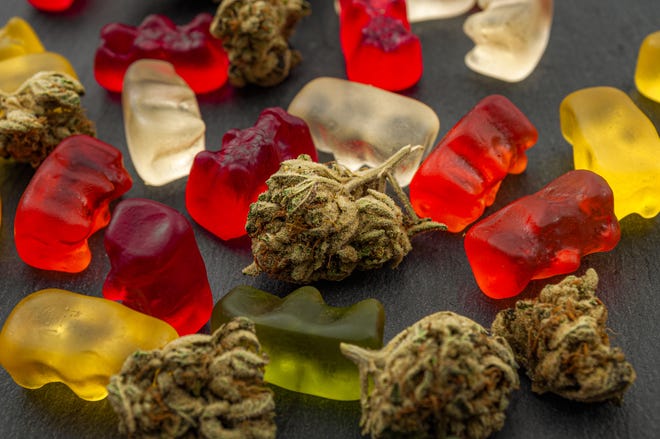With the legalization of cannabis in various states, there has been a notable increase in its accessibility to minors, particularly through edibles that often resemble regular food items, leading to confusion among teenagers and children.
Adults between 18-25 years are the primary consumers of marijuana products. However, the Journal of Cannabis Research highlights a worrying trend: the incidence of children under 6 years ingesting cannabis products soared by 1,375% from 2017 to 2021, as reported by USA TODAY.
There is ongoing debate regarding the responsibility of packaging design in these incidents.
Parents should be informed about the risks cannabis poses to children.
Increased Child Admissions in Hospitals Due to Cannabis
From 2017 to 2021, numerous children were hospitalized due to edible cannabis exposure, as revealed in recent studies.
The data indicates:
- 573 children in critical care
- 1,027 children in non-critical care
- 2,550 emergency room visits
- 625 cases declined treatment/did not seek hospitalization
- 2,268 cases with unknown outcomes/no follow-up
Dr. Natalie Laub, a pediatric expert and cannabis researcher at Rady Children’s Hospital in San Diego, spoke to the San Diego Union-Tribune about the rise in cases of children with seizures and respiratory issues.
Dr. Beth Ebel, a pediatrician at Washington Medicine, echoed similar concerns in an interview with a Portland news outlet.
“We encounter these cases frequently. In the emergency room, we’re often trying to determine whether a child has a serious neurological condition or has ingested cannabis,” Dr. Ebel stated.
Issues with Edible Cannabis Packaging and Flavors
The FTC and pediatricians have raised concerns that the rise in cannabis exposure among children is linked to the way these products are packaged.
Due to marijuana’s federal illegality, packaging regulation varies by state, making consistent control challenging.
Katherine Keyes, a Columbia University professor, emphasized that it’s not only the packaging but the products themselves that pose a risk.
“Authorities should think about limiting candy and fruit flavors in these products. We need more public health research to understand what products are most attractive to young people,” Keyes advised.
A recent incident involved a Cincinnati couple whose daughter suffered a seizure after consuming THC-laced gum on her school bus, as reported by the news.
Children often fail to distinguish between regular snacks and THC-infused products, such as chocolates, gummy bears, or THC chips. Dr. Marit Tweet, a medical toxicologist and emergency physician at Southern Illinois University School of Medicine, highlighted the risk of children not recognizing the potency of THC in edibles.
Last summer, the Federal Trade Commission and the U.S. Food and Drug Administration issued cease and desist letters to six companies for marketing products resembling popular snacks:
- Delta Munchies LLC (Los Angeles, California)
- Exclusive Hemp Farms(Gilroy, California) and Etienne-DuBois LLC/Oshipt (Henrico, Virginia)
- North Carolina Hemp Exchange, LLC, dba NC Hemp Shoppe (Raleigh, North Carolina)
- Dr. Smoke, LLC, aka Dr. S, LLC (Kansas City, Missouri)
- Nikte’s Wholesale, LLC (Albuquerque, New Mexico)
- The Haunted Vapor Room(Franklin, New Jersey)
The FTC continues to urge sellers to review their marketing and packaging strategies, as stated in a press release.
Parents need to be aware that THC content varies by state, and some states have started imposing restrictions on packaging that appeals to youth.
Information on packaging regulations can be found here.
Recognizing Cannabis Ingestion in Children
Signs to look out for if you suspect a child has ingested cannabis, as per Poison Control:
- vomiting
- dizziness
- coordination issues
- elevated heart rate
- lethargy
- confusion
- respiratory difficulties
In severe cases:
- hallucinations
- decreased heart rate
- low blood pressure
If you suspect cannabis ingestion, contact Poison Control at 1-800-222-1222 or dial 911, and visit the nearest urgent care center.
Tips for Safe Cannabis Storage at Home
For parents who use cannabis products responsibly but are concerned about home safety, Ali Sawani, a pediatric resident at Nationwide Childrens Hospital, offers these tips for safer storage:
- Safe storage or no storage. Preferably, keep cannabis away from your home. If it’s necessary, store it securely and out of children’s sight, as with medications, Sawani advises.
- Consume away from children. Avoid using these products in front of kids to prevent normalization. The THC in these products may be harmless to adults but potentially dangerous for children.
- Communicate with caregivers. Discuss safe usage and storage of cannabis products with anyone involved in your child’s care, emphasizing sobriety when children are around.
OTHER NEWS: NYC Agrees to 75K Settlement with Mother Separated from Newborn Due to Cannabis Use










